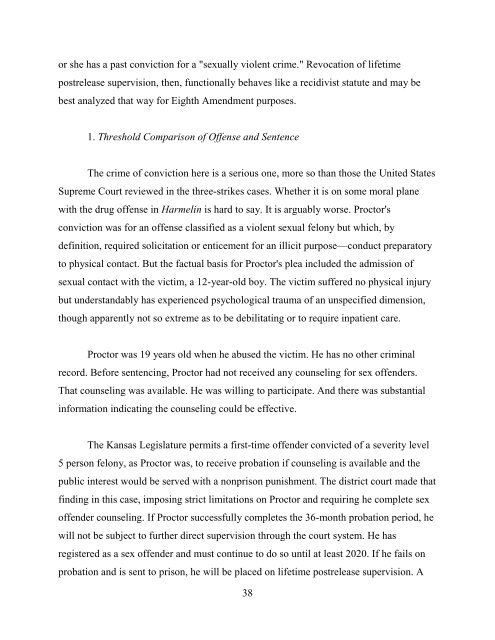State v. Proctor - Kansas Judicial Branch
State v. Proctor - Kansas Judicial Branch
State v. Proctor - Kansas Judicial Branch
You also want an ePaper? Increase the reach of your titles
YUMPU automatically turns print PDFs into web optimized ePapers that Google loves.
or she has a past conviction for a "sexually violent crime." Revocation of lifetime<br />
postrelease supervision, then, functionally behaves like a recidivist statute and may be<br />
best analyzed that way for Eighth Amendment purposes.<br />
1. Threshold Comparison of Offense and Sentence<br />
The crime of conviction here is a serious one, more so than those the United <strong>State</strong>s<br />
Supreme Court reviewed in the three-strikes cases. Whether it is on some moral plane<br />
with the drug offense in Harmelin is hard to say. It is arguably worse. <strong>Proctor</strong>'s<br />
conviction was for an offense classified as a violent sexual felony but which, by<br />
definition, required solicitation or enticement for an illicit purpose—conduct preparatory<br />
to physical contact. But the factual basis for <strong>Proctor</strong>'s plea included the admission of<br />
sexual contact with the victim, a 12-year-old boy. The victim suffered no physical injury<br />
but understandably has experienced psychological trauma of an unspecified dimension,<br />
though apparently not so extreme as to be debilitating or to require inpatient care.<br />
<strong>Proctor</strong> was 19 years old when he abused the victim. He has no other criminal<br />
record. Before sentencing, <strong>Proctor</strong> had not received any counseling for sex offenders.<br />
That counseling was available. He was willing to participate. And there was substantial<br />
information indicating the counseling could be effective.<br />
The <strong>Kansas</strong> Legislature permits a first-time offender convicted of a severity level<br />
5 person felony, as <strong>Proctor</strong> was, to receive probation if counseling is available and the<br />
public interest would be served with a nonprison punishment. The district court made that<br />
finding in this case, imposing strict limitations on <strong>Proctor</strong> and requiring he complete sex<br />
offender counseling. If <strong>Proctor</strong> successfully completes the 36-month probation period, he<br />
will not be subject to further direct supervision through the court system. He has<br />
registered as a sex offender and must continue to do so until at least 2020. If he fails on<br />
probation and is sent to prison, he will be placed on lifetime postrelease supervision. A<br />
38

















